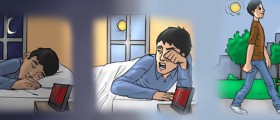I am 42 years old and would like to no if having two periods in 1 month is there a concern there now i,m have cramps in my lower ab and lower back what do this mean .
Loading...
If it just happens once, or once every few years, don't worry. "28 days" is just an average. A menstrual cycle can last from 20 to 40 days... sometimes a couple of months.
If it happens frequently, ask your doctor.
Cramps are caused by the same hormones that cause the bleeding. Unless they're so severe that they stop you from doing things, there's nothing wrong. Midol or Advil will help.
If it happens frequently, ask your doctor.
Cramps are caused by the same hormones that cause the bleeding. Unless they're so severe that they stop you from doing things, there's nothing wrong. Midol or Advil will help.
Loading...
Hi,
What about menopause? Have you considered this for an option of your sudden period? It might be a few year earlier but this can happen. Also there were a lot of members that experienced early menopause in an age from 35 to 40 years.
But like hkmarks said this can happen sometimes.
Have you been using any pills?
What about menopause? Have you considered this for an option of your sudden period? It might be a few year earlier but this can happen. Also there were a lot of members that experienced early menopause in an age from 35 to 40 years.
But like hkmarks said this can happen sometimes.
Have you been using any pills?
Loading...
I totally agree with this, so I would say that what hkmarks said is totally normal. As for skipping a period, I undersand that women do it once in awhile but can you explain to me what actually causes a woman to skip?
Loading...
The menstrual cycle is just a repeated hormone cycle. It's sort of like the circadian rhythm (the daily sleep-wake cycle) but much longer. Both are controlled by the endocrine system -- the biological clock.
Over the course of a day, you wake up, are active for a bit, might get a little tired in the afternoon, then get active in the late afternoon, then get very tired at night, fall asleep, and maybe wake in the middle of the night before sleeping 'til morning. Various things like noise, light, stress, exercise, and food influence when each stage happens and how long they last. Eg. if you have bright lights on, or something on your mind, you might have trouble falling to sleep. If you sleep particularly well, you might wake up earlier than usual. Sometimes it's not obvious at all why you get sleepy or wake up when you do -- it just happens. On average people have a daily cycle of around 24-25 hours, but for some it's longer and for some it's shorter.
The menstrual cycle is pretty much the same deal. The circadian rhythm works with the hormone melatonin; the menstrual cycle works mainly with estrogen. But the biological clock isn't a machine, so it just isn't perfectly regular. There are too many factors (stress, diet, illness, age, etc.) pushing it in every direction.
If one of those factors is a serious illness, then that IS a concern... but one early, late, heavy, or light period should not be alarming.
Over the course of a day, you wake up, are active for a bit, might get a little tired in the afternoon, then get active in the late afternoon, then get very tired at night, fall asleep, and maybe wake in the middle of the night before sleeping 'til morning. Various things like noise, light, stress, exercise, and food influence when each stage happens and how long they last. Eg. if you have bright lights on, or something on your mind, you might have trouble falling to sleep. If you sleep particularly well, you might wake up earlier than usual. Sometimes it's not obvious at all why you get sleepy or wake up when you do -- it just happens. On average people have a daily cycle of around 24-25 hours, but for some it's longer and for some it's shorter.
The menstrual cycle is pretty much the same deal. The circadian rhythm works with the hormone melatonin; the menstrual cycle works mainly with estrogen. But the biological clock isn't a machine, so it just isn't perfectly regular. There are too many factors (stress, diet, illness, age, etc.) pushing it in every direction.
If one of those factors is a serious illness, then that IS a concern... but one early, late, heavy, or light period should not be alarming.
Loading...
This is very good post. You really explained it nicely.
I am just interested in your opinion which of these factors is most influential on menstruation?
I am just interested in your opinion which of these factors is most influential on menstruation?
Loading...
What factor is most important will vary from person to person. And some of them probably haven't been discovered yet...
Overall, genetics in general is the big one... we are like our parents. Nutrition and body fat content are probably the second. After that, illnesses. And of course age is sort of the One To Rule Them All. Anyway IANAD and that's pretty much tapped out my knowledge. ;-)
Overall, genetics in general is the big one... we are like our parents. Nutrition and body fat content are probably the second. After that, illnesses. And of course age is sort of the One To Rule Them All. Anyway IANAD and that's pretty much tapped out my knowledge. ;-)
Loading...
Thanks so much for clarifying all that for me. I wasn't entirely sure so thank you for shedding some light on that for me. Where did you learn all this??
Loading...
Hi hkmarks,
I agree with you on genetics, but do you think is it possible for us to change some of our genetics. I am talking here about doing different things than our parents, for instance, eating very different food. Do you think that this would also be a big factor?
I agree with you on genetics, but do you think is it possible for us to change some of our genetics. I am talking here about doing different things than our parents, for instance, eating very different food. Do you think that this would also be a big factor?
Loading...
AFAIK food has two effects on menstruation.
If a pre-pubescent girl is bigger than average, she will often start puberty earlier. (Apparently that's because the body says "ok, time for puberty" based on overall body weight AND age, not age alone.) That is why the age of menarche has been getting a little earlier over the past few decades -- people eat more and grow taller and/or fatter.
The other thing is, if a girl or woman's body fat is VERY low, her period can stop. (Amenorrhea.) This is most often seen with anorexia or starvation. Sometimes it's also seen with hard-core athletes who simply burn off so much fat, even though they're eating plenty, that they don't menstruate any more. Sometimes it's both, especially in sports like dance and gymnastics where a thin and compact figure is especially valued. (I think the body just says, "well, I don't have enough fat to waste on a baby, so I'm not going to bother.)
Other than that... food doesn't matter much.
The one other external thing that'll influence menstruation, as far as I know, is taking oral contraceptives.
(I learned this stuff partly from JHS/HS/Uni, partly from TV, newspapers and magazines, & partly from net research... a while back I was trying to figure out how to reduce my cramps. I started taking magnesium supplements. Too soon to tell if it's working.)
If a pre-pubescent girl is bigger than average, she will often start puberty earlier. (Apparently that's because the body says "ok, time for puberty" based on overall body weight AND age, not age alone.) That is why the age of menarche has been getting a little earlier over the past few decades -- people eat more and grow taller and/or fatter.
The other thing is, if a girl or woman's body fat is VERY low, her period can stop. (Amenorrhea.) This is most often seen with anorexia or starvation. Sometimes it's also seen with hard-core athletes who simply burn off so much fat, even though they're eating plenty, that they don't menstruate any more. Sometimes it's both, especially in sports like dance and gymnastics where a thin and compact figure is especially valued. (I think the body just says, "well, I don't have enough fat to waste on a baby, so I'm not going to bother.)
Other than that... food doesn't matter much.
The one other external thing that'll influence menstruation, as far as I know, is taking oral contraceptives.
(I learned this stuff partly from JHS/HS/Uni, partly from TV, newspapers and magazines, & partly from net research... a while back I was trying to figure out how to reduce my cramps. I started taking magnesium supplements. Too soon to tell if it's working.)
Loading...
Very informative post. How long are you taking magnesium supplements? I know that cramps can be the cause of lack of magnesium in the body. I hope that it will work for you.
Loading...
















